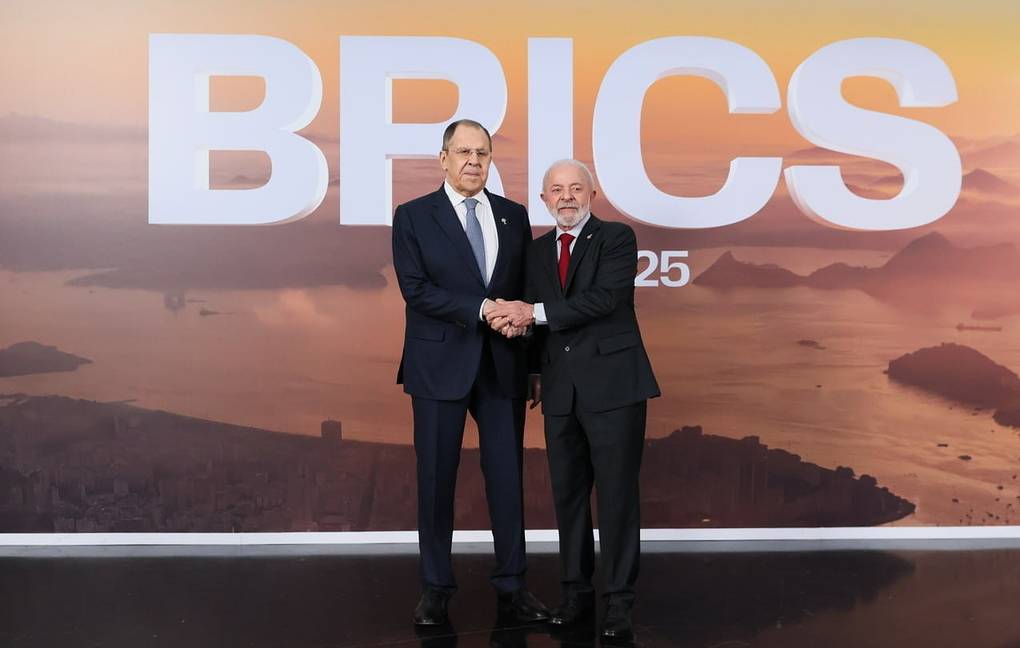Press review: BRICS tackles integration challenges as Russia counters NATO expansion
Top stories from the Russian press on Tuesday, July 8th Russian Foreign Minister Sergey Lavrov and Brazilian President Luiz Inacio Lula da Silva
Russian Foreign Minister Sergey Lavrov and Brazilian President Luiz Inacio Lula da Silva
MOSCOW, July 8. /TASS/. BRICS faces the need to effectively integrate new members; Russia is set to respond to NATO’s military build-up in Northern Europe; and the US may postpone the resumption of a global trade war. These stories have topped Tuesday’s newspaper headlines across Russia.
Izvestia: challenge for BRICS is to efficiently integrate new members
Strengthening a multilateral world order is one of the major challenges for the BRICS group, Russian Foreign Minister Sergey Lavrov said, summarizing the group’s summit that took place in Rio de Janeiro, Brazil, on July 6-7. In order to make consensus-based decisions, it is crucial to seamlessly integrate new members and partner states, Alexander Shchetinin, head of the Russian Foreign Ministry’s Department of Latin America, told Izvestia.
-
For quite a while, BRICS consisted of five nations — Brazil, Russia, India, China and South Africa. Egypt, Iran, the United Arab Emirates and Ethiopia became the group’s full members on January 1, 2024, followed by Indonesia in January 2025. In addition, BRICS introduced the category of partner states last year, granting the status to Belarus, Bolivia, Cuba, Kazakhstan, Malaysia, Nigeria, Thailand, Uganda, Uzbekistan, and Vietnam.
Now, the challenge for BRICS is to make sure that new members and partner states join the group in a smooth manner and become part of its activities, Shchetinin observed. "This is why the issue of steps related to the group’s expansion has to be based on some future decisions endorsed by all countries," the diplomat stated. "Undoubtedly, given the rising importance of Latin American nations’ role in global politics and economy, we would welcome their louder and more distinct voice within BRICS," he added.
In economic terms, reducing reliance on the US dollar is essential for BRICS nations, Alexander Savchenko, head of the Department of Government Administration and Public Policy at the Russian Presidential Academy of National Economy and Public Administration, pointed out. "This is a cornerstone of economic policy because whoever has the money, runs the economy. American prosperity is believed to be largely based on the fact that other countries have to purchase dollars to use them for payments," the expert explained.
As for BRICS’ expansion, Brazil’s ambassador to Russia says that his country calls for including more countries into the group. Rodrigo de Lima Baena Soares noted in a conversation with Izvestia that BRICS now has more than half of the world’s population, including very vigorous economic powers.
Izvestia: Russia to counter NATO’s military expansion in Northern Europe
Moscow will respond to NATO’s growing presence in the Baltic region where the bloc’s member states continue their military build-up, Russian Ambassador to Stockholm Sergey Belyayev told Izvestia. An organization similar to the Arctic Council needs to be created to ensure stability in the Baltic region, Richard Balfe, member of the House of Lords of the United Kingdom, told the paper.
Lavrov notes growing differences within NATO
NATO countries have stepped up their efforts to militarize the Baltic Sea, with one of their goals being to set up artificial barriers for Russian ships, Moscow’s envoy to Sweden Sergey Belyayev noted. "Since joining NATO, Stockholm has been actively boosting military cooperation not only with the bloc in general but also with its individual member states, primarily the United States and France. If NATO troops and weapons are deployed to Sweden, our country will certainly be ready to give an adequate response," the diplomat stressed.
The Baltic Sea region clearly is one of Russia’s spheres of interest and Moscow will actively oppose any attempt the West could make to block Russia’s Baltic ports and prevent ships from going to sea from St. Petersburg and Kaliningrad, Alexey Zhuravlyov, first deputy chairman of the Russian State Duma (lower house of parliament) Committee on Defense, emphasized.
Yury Zverev, director of the Center for Foreign Regional and Country Studies at Immanuel Kant Baltic Federal University, pointed out that the 2024 edition of the Foundations of Russia’s State Policy in the Field of Nuclear Deterrence lists a potential enemy’s actions aimed at isolating parts of Russia as one of the military threats that should be addressed through nuclear deterrence. This is about responding to a potential attempt to impose a blockade on Russia’s westernmost Kaliningrad Region.
Escalating tensions pose a danger for NATO countries, too. Richard Balfe, member of the British Parliament's House of Lords, believes that Western countries and Russia need to cooperate to establish a body similar to the Arctic Council, where all Northern European countries would be able to work together. In the lawmaker’s view, the most important thing is to create an institutional framework that everyone will respect. It may well include a promise by NATO not to hold drills in Baltic countries in exchange for guarantees from all nations to respect borders, as well as a mutual agreement not to interfere with each other’s cable networks and other maritime infrastructure, the politician told Izvestia.
Media: US may postpone resumption of global trade war
US President Donald Trump has begun to send "tariff letters" to other countries, outlining the conditions for trade deals and the level of potential tariffs if no agreements are reached. He has also threatened to impose additional 10% tariffs on the countries "aligning themselves with the anti-American policies of BRICS," Vedomosti notes.
Trump threatens additional 10% tariff on countries aligning themselves with BRICS’ policy
Prior to that, signs emerged of a potential delay in the full-scale revival of the April 2 retaliatory tariffs, which had been scheduled for July 9. US Secretary of the Treasury Scott Bessent and Kevin Hasset, chairman of the President’s Council of Economic Advisers, hinted at such a possibility. However, it is still unclear with how many countries the US is in trade negotiations. As for specific deals, so far, partial agreements have been reached only with China and the United Kingdom, and a trade deal has been made with Vietnam.
The markets reacted painfully the last time the US announced tariffs so the Washington administration is likely to take it into account during talks with trading partners, said Maxim Cherkashin, junior researcher with the Center for North American Studies at the Russian Academy of Sciences’ Institute of World Economy and International Relations. However, the expert does not rule out that the US will eventually introduce tariffs against the European Union. Washington has almost reached deals with two of its three largest trading partners, China and Canada, which makes it possible to target the EU, the analyst explained.
Although the July 9 deadline is still there, the resumed higher tariffs will in fact take effect on August 1, Andrey Kochetkov, a private investment consultant, noted. According to him, the countries that are in talks with the US will be given time to accelerate the process.
As for Russia, even though the country is a BRICS member, it won’t face a major impact from Trump’s tariffs because Moscow’s trade with Washington has been reduced to the lowest possible level due to sanctions, Andrey Petrov, director for operations with wealthy clients at BCS World of Investment, told Izvestia. Still, trade wars always lead to a drop in global demand and a rise in uncertainty, the specialist added.
Nezavisimaya Gazeta: Military-related missions await Ukraine's new ambassador to US
The US and Ukrainian media began the week by debating about a potential replacement for Kiev’s Ambassador to Washington Oksana Markarova, whose resignation Vladimir Zelensky has recently discussed with US President Donald Trump. Ukraine’s move to replace Markarova, who earlier angered the US leader, could serve as a formal reason for the renewal of Washington’s military assistance to Kiev, said experts interviewed by Nezavisimaya Gazeta.
Sources say that potential candidates for Ukraine’s ambassador to the US include Prime Minister Denis Shmygal, Deputy Prime Minister Olga Stefanishina, Defense Minister Rustem Umerov and Energy Minister German Galushchenko.
Previously, after the November 2024 US presidential election, media outlets pointed to a conflict between the current Ukrainian envoy and the new US leader, which stemmed from Kiev’s support for former President Joe Biden — a policy the ambassador had to follow. Later, Markarova sought to mend relations between the Ukrainian and US presidents, Oleg Barabanov, Moscow State Institute of International Relations professor and Valdai International Discussion Club program director, pointed out. That said, it’s possible that she became more of an irritant for Vladimir Zelensky than for Donald Trump, in light of unsuccessful attempts to promote Kiev’s policy in Washington. In any case, Barabanov says, although the move to replace Ukraine’s ambassador is not crucial in terms of US military assistance for Kiev, it could still be used as a formal reason for resuming aid.
Notably, over the weekend, Zelensky announced the signing of another package of sanctions on Russia, describing it as "special." Later in the week, Kiev officials are expected to work on synchronizing their decisions with those made by the European Union. The restrictions Ukraine has introduced so far are clearly tougher compared to those of its foreign partners, but it is also clear that Kiev’s sanctions cannot have any major impact on global trade. "It’s important for the Kiev leadership to make sure that its sanctions are included if not into US packages then at least into European ones. It seems the Ukrainians intend to step up lobbying efforts via various channels in order to promote their own restrictions," the analyst assumed.
Rossiyskaya Gazeta: Challenges facing US dollar boost Russian ruble
The US dollar had an extremely bad time in the first six months of 2025. It has been over 50 years since it depreciated against other currencies so quickly and so sharply. It’s certainly too early to talk about the dollar’s collapse, but if the process continues, the US currency’s role as a safe haven for investors will erode even more. Meanwhile, the weakening dollar has made the Russian ruble stronger, accounting for about one-third of the recent rise in its value, Rossiyskaya Gazeta reports.
It is no coincidence that the dollar declined in the first six months of Donald Trump’s second presidential term. It’s not so much economic decisions that dealt a blow to the dollar but the unpredictable and sometimes provocative actions and statements by Trump and his administration. Over the past months, the dollar has been affected by trade wars with China and other countries, criticism of the US Federal Reserve’s cautious monetary system, and the adoption of the Big Beautiful Bill, which reduces certain government expenditures and increases borrowing.
Trump and his administration have nothing against a weak dollar as it is in line with their economic policy based on attempts to reduce a negative trade balance with other countries. Still, basically, a too weak dollar is not unambiguously beneficial for the US economy because foreign investment will slow down and import costs will grow for the end consumer, Head of Analytics at Zenit Bank Vladimir Yevstifeyev stressed.
However, there is so far no reason to believe that the dollar will strengthen in the second half of the year. According to Yevstifeyev, the adoption of the Big Beautiful Bill will inevitably increase the growth rate of the US public debt, forcing investors to look for new safe havens.
In contrast, the Russian ruble significantly strengthened against the dollar in the same six months, growing by more than 30%. Yevstifeyev estimates that one-third of the growth stemmed from the dollar’s dynamics, while the rest has to do with Russia’s high key interest rate, declining imports and positive geopolitical news. Still, given that these factors are temporary, the risk is high that the ruble will weaken in the coming months, the expert warned.

